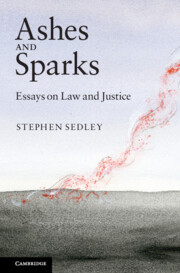Book contents
- Frontmatter
- Contents
- Preface
- Acknowledgements
- PART I History
- PART II Law
- PART III Justice
- 24 The right to know
- 25 The moral economy of judicial review
- 26 Policy and law
- 27 Responsibility and the law
- 28 The Crown in its own courts
- 29 Human rights – who needs them?
- 30 Fundamental values – but which?
- 31 Overcoming pragmatism
- 32 Sex, libels and video-surveillance
- 33 This beats me
- 34 Public inquiries: a cure or a disease?
- 35 Human rights: a twenty-first century agenda
- 36 Are human rights universal, and does it matter?
- 37 Bringing rights home: time to start a family?
- 38 The four wise monkeys visit the marketplace of ideas
- Index
36 - Are human rights universal, and does it matter?
Published online by Cambridge University Press: 05 June 2012
- Frontmatter
- Contents
- Preface
- Acknowledgements
- PART I History
- PART II Law
- PART III Justice
- 24 The right to know
- 25 The moral economy of judicial review
- 26 Policy and law
- 27 Responsibility and the law
- 28 The Crown in its own courts
- 29 Human rights – who needs them?
- 30 Fundamental values – but which?
- 31 Overcoming pragmatism
- 32 Sex, libels and video-surveillance
- 33 This beats me
- 34 Public inquiries: a cure or a disease?
- 35 Human rights: a twenty-first century agenda
- 36 Are human rights universal, and does it matter?
- 37 Bringing rights home: time to start a family?
- 38 The four wise monkeys visit the marketplace of ideas
- Index
Summary
One of the paradoxes of human rights is that both their status as rights and their availability to all human beings is constantly contested. You can regard this as no more than a series of shortcomings in an imperfect world; but you can also see it as a consequence of the specificity of human rights as a twentieth-century artefact of Western liberalism.
If the latter is the case, does it mean that the movement for human rights is either a hopeless errand or – with all that the word implies – a crusade? Or is it, as I suggest in this paper, given as the Holdsworth Lecture in November 2005 at Birmingham University, an argument worth conducting and if possible winning in a changing world?
One of the stimuli for this paper was a packed seminar at the Sorbonne in the spring of 2001 at which I had the task of responding to Ronald Dworkin's presentation of his thesis on the universality of human rights, elegantly structured and delivered, as always, without a note. This is the fuller response I might have given.
It seems elementary that entitlements which are human rights must be part of every human being's birthright: in other words, that rights which are not recognised as universal cannot be human rights. It may be that in practice not all human beings enjoy them or even know what they are, but that doesn't make them, as entitlements, any less universal.
- Type
- Chapter
- Information
- Ashes and SparksEssays On Law and Justice, pp. 365 - 376Publisher: Cambridge University PressPrint publication year: 2011



